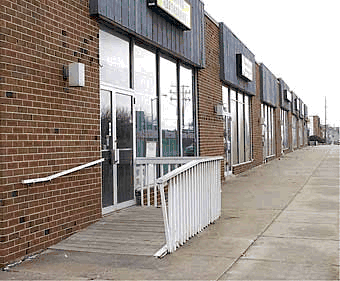Issue: Local Laws, Ordinances, and Regulations
Common Problem:
City governments may fail to consider reasonable modifications in local laws, ordinances, and regulations that would avoid discrimination against individuals with disabilities.
Result:
Laws, ordinances, and regulations that appear to be neutral often adversely impact individuals with disabilities. For example, where a municipal zoning ordinance requires a set-back of 12 feet from the curb in the central business district, installing a ramp to ensure access for people who use wheelchairs may be impermissible without a variance from the city. People with disabilities are therefore unable to gain access to businesses in the city.

City zoning policies were changed to permit this business to install a ramp at its entrance.
Requirement:
City governments are required to make reasonable modifications to policies, practices, or procedures to prevent discrimination on the basis of disability. Reasonable modifications can include modifications to local laws, ordinances, and regulations that adversely impact people with disabilities. For example, it may be a reasonable modification to grant a variance for zoning requirements and setbacks. In addition, city governments may consider granting exceptions to the enforcement of certain laws as a form of reasonable modification. For example, a municipal ordinance banning animals from city health clinics may need to be modified to allow a blind individual who uses a service animal to bring the animal to a mental health counseling session. 28 C.F.R. § 35.130(b)(7).

User Comments/Questions
Add Comment/Question